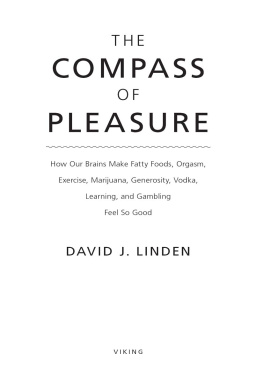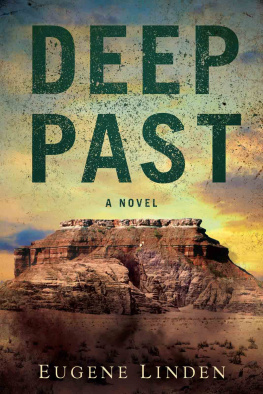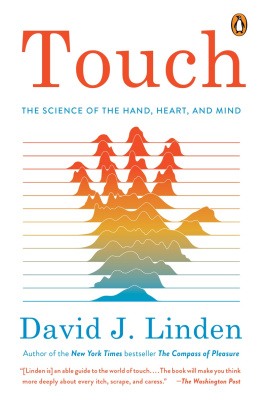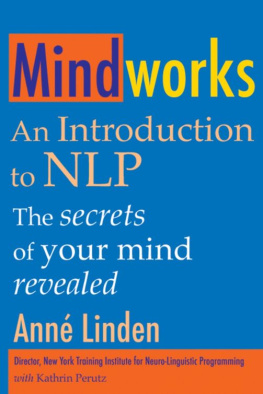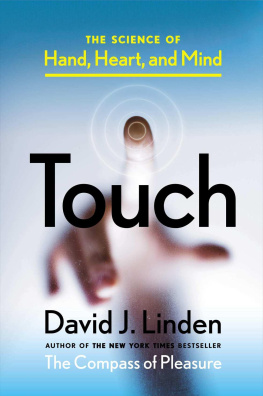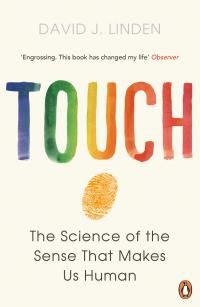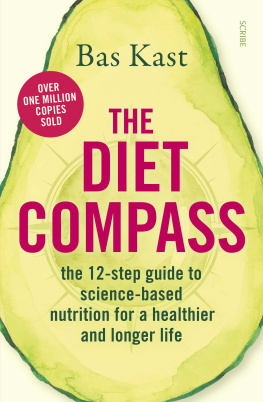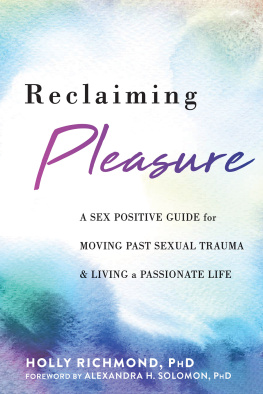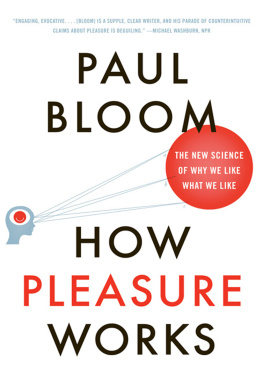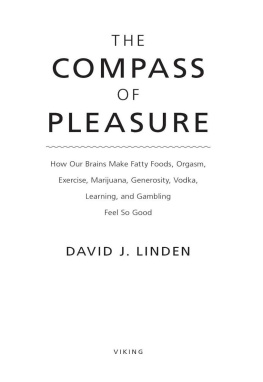ALSO BY DAVID J. LINDEN
THE COMPASS OF PLEASURE

How Our Brains Make Fatty Foods, Orgasm, Exercise, Marijuana, Generosity, Vodka, Learning, and Gambling Feel So Good
DAVID J. LINDEN
VIKING
VIKING
Published by the Penguin Group
Penguin Group (USA) Inc., 375 Hudson Street, New York, New York 10014, U.S.A.
Penguin Group (Canada), 90 Eglinton Avenue East, Suite 700, Toronto,
Ontario, Canada M4P 2Y3 (a division of Pearson Penguin Canada Inc.)
Penguin Books Ltd, 80 Strand, London WC2R 0RL, England
Penguin Ireland, 25 St Stephens Green, Dublin 2, Ireland (a division of Penguin Books Ltd)
Penguin Books Australia Ltd, 250 Camberwell Road, Camberwell, Victoria 3124, Australia
(a division of Pearson Australia Group Pty Ltd)
Penguin Books India Pvt Ltd, 11 Community Centre, Panchsheel Park,
New Delhi 110 017, India
Penguin Group (NZ), 67 Apollo Drive, Rosedale, Auckland 0632, New Zealand
(a division of Pearson New Zealand Ltd)
Penguin Books (South Africa) (Pty) Ltd, 24 Sturdee Avenue, Rosebank,
Johannesburg 2196, South Africa
Penguin Books Ltd, Registered Offices: 80 Strand, London WC2R 0RL, England
First published in 2011 by Viking Penguin, a member of Penguin Group (USA) Inc.
Copyright David J. Linden, 2011
All rights reserved
Excerpt from Knockemstiff by Donald Ray Pollock. Copyright 2008 by Donald Ray
Pollock. Used by permission of Doubleday, a division of Random House, Inc.
LIBRARY OF CONGRESS CATALOGING-IN-PUBLICATION DATA
Linden, David J.
The compass of pleasure: how our brains make fatty foods, orgasm, exercise, marijuana, generosity, vodka, learning, and gambling feel so good / David J. Linden.
p. cm.
Includes bibliographical references and index.
ISBN: 978-1-101-47641-3
1. PleasurePhysiological aspects. 2. Neuropsychology. I. Title.
QP401.L56 2011
612.8dc22 2010035380
Without limiting the rights under copyright reserved above, no part of this publication may be reproduced, stored in or introduced into a retrieval system, or transmitted, in any form or by any means (electronic, mechanical, photocopying, recording, or otherwise), without the prior written permission of both the copyright owner and the above publisher of this book.
The scanning, uploading, and distribution of this book via the Internet or via any other means without the permission of the publisher is illegal and punishable by law. Please purchase only authorized electronic editions and do not participate in or encourage electronic piracy of copyrightable materials. Your support of the authors rights is appreciated.
For Elaine Levin
CONTENTS
Pleasure never comes sincere to man;
but lent by heaven upon hard usury.
John Dryden, Edippus
Phil was probably passed out somewhere, enjoying his dead fathers legacy. I found myself wishing I had a loved one who would die and leave me their barbiturates, but I couldnt think of anyone whod ever loved me that much. My uncle had already promised his to the mail lady.
Donald Ray Pollock, Bactine
PROLOGUE
B angkok, 1989. The afternoon rains have ended, leaving the early evening air briefly free of smog and allowing that distinctive Thai perfume, frangipani with a faint note of sewage, to waft over the shiny streets. I hail a tuk-tuk , a three-wheel motorcycle taxi, and hop aboard. My young driver has an entrepreneurial smile as he turns around and begins the usual interrogation of male travelers.
So you want girl?
No.
I see. Long pause, eyebrows slowly raised. You want boy!
Uh, no.
Longer pause. Sound of engine sputtering at idle. You want ladyboy?
No, I answer, a bit more emphatically, nonplussed at the idea that I give the impression of desiring this particular commodity.
I got cheap cigarettes Johnnie Walker
No thanks.
Undaunted, he moves on to the next category of his wares, now with lowered voice.
You want ganja?
No.
Coke?
No.
Ya baa [methamphetamine tablets]?
Nope.
A whisper now. Heroin?
No.
Voice raised back to normal. I can take you to cockfight. You can gamble!
Ill pass.
Just a little bit irritated now. So, farang , what you want?
Prik kee noo , I respond. Those little mouse shit peppers. I want some good, spicy dinner. My driver, not surprisingly, is disappointed. As we tear through the streets to a restaurant, blasting through puddles, Im left wondering: Aside from various shades of illegality, what do all his offers have in common? What is it exactly that makes a vice?
We humans have a complicated and ambivalent relationship to pleasure, which we spend an enormous amount of time and resources pursuing. A key motivator of our lives, pleasure is central to learning, for we must find things like food, water, and sex rewarding in order to survive and pass our genetic material to the next generation. Certain forms of pleasure are accorded special status. Many of our most important rituals involving prayer, music, dance, and meditation produce a kind of transcendent pleasure that has become deeply ingrained in human cultural practice.
As we do with most powerful forces, however, we also want to regulate pleasure. In cultures around the world we find well-defined ideas and rules about pleasure that have persisted throughout history in any number of forms and variations:
Pleasure should be sought in moderation.
Pleasure must be earned.
Pleasure must be achieved naturally.
Pleasure is transitory.
The denial of pleasure can yield spiritual growth.
Our legal systems, our religions, our educational systems are all deeply concerned with controlling pleasure. We have created detailed rules and customs surrounding sex, drugs, food, alcohol, and even gambling. Jails are bursting with people who have violated laws that proscribe certain forms of pleasure or who profit by encouraging others to do so.
One can fashion reasonable theories of human pleasure and its regulation using the methods of cultural anthropology or social history. These are valid and useful endeavors, for ideas and practices involving human pleasure are certainly deeply influenced by culture. However, what Im seeking here in The Compass of Pleasure is a different type of understandingone less nuanced, perhaps, but more fundamental: a cross-cultural biological explanation. In this book I will argue that most experiences in our lives that we find transcendentwhether illicit vices or socially sanctioned ritual and social practices as diverse as exercise, meditative prayer, or even charitable givingactivate an anatomically and biochemically defined pleasure circuit in the brain. Shopping, orgasm, learning, highly caloric foods, gambling, prayer, dancing til you drop, and playing on the Internet: They all evoke neural signals that converge on a small group of interconnected brain areas called the medial forebrain pleasure circuit. It is in these tiny clumps of neurons that human pleasure is felt. This intrinsic pleasure circuitry can also be co-opted by artificial activators like cocaine or nicotine or heroin or alcohol. Evolution has, in effect, hardwired us to catch a pleasure buzz from a wide variety of experiences from crack to cannabis, from meditation to masturbation, from Bordeaux to beef.

